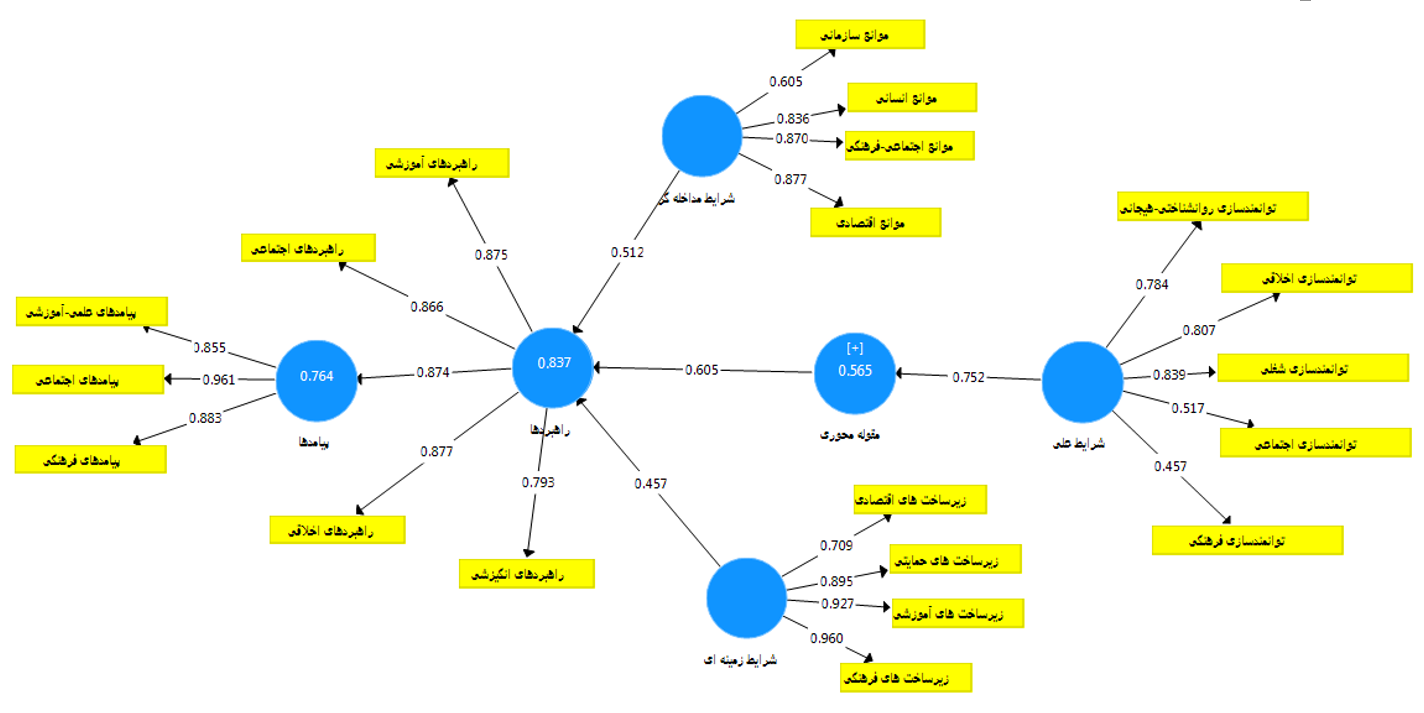Validation of the Empowerment Model for Educational System Managers to Enhance Social Security in Tourist Areas
Keywords:
accreditation, social security, empowerment, educational system managers, tourism areasAbstract
The present study aimed to validate an empowerment model for educational system managers to enhance social security in tourist areas. This study was correlational in nature, utilizing structural equation modeling. The study population consisted of all educational system managers, including school principals and education administrators in Mazandaran province, who were active during the 2024-2025 academic year. To estimate the sample size, Cochran's formula was used, and after accounting for a 20% dropout rate, the final sample size of 320 participants was randomly selected. For evaluating the construct validity of the proposed model, first- and second-order confirmatory factor analyses were conducted using AMOS 24 software. To examine the paradigm model of the study, structural equation modeling based on Partial Least Squares (PLS-3) was employed, and the direct effect regression coefficients for all model pathways were reported. According to the results, the standardized factor loadings for each primary and secondary category of the empowerment factors for educational managers aimed at enhancing social security in tourist areas were greater than 0.40 and were confirmed. The convergent and discriminant validity of the scales in the proposed model were also satisfactory. Additionally, the overall model fit was confirmed, and both the structural and measurement models demonstrated adequate quality in explaining the research variables. Therefore, the use of the model derived from this study for empowering educational managers to enhance social security in tourist areas is an effective method with high validity.
Downloads
References
Tariqi E, Haghighi M, editors. Examining the Role of Efficient Management on Employee Empowerment With an
Emphasis on Purposeful Learning and Utilizing Educational and Human-Building Lessons. Second National Conference on
Family and School Studies; 2023; Bandar Abbas.
Han S, Harold CM, Kim JK, Vogel RM. Perceived Benefits and Costs of Empowerment: Conceptualization, Measure
Development, and Its Impact on Empowering Leadership. Journal of Management. 2022;49(4):1-18. doi:
1177/01492063221081443.
Esmaeili Ahendani A, Shakibaei Z, Ashouri H. Designing and Explaining a Structural Empowerment Model for
Human Resources Using Grounded Theory. Islamic Lifestyle with a Focus on Health. 2023;7(3):121-36.
Kanjanakan P, Wang P, Kim PB. The empowering, the empowered, and the empowerment disparity: A multilevel
analysis of the integrated model of employee empowerment. Tourism Management. 2023;94:104635. doi:
1016/j.tourman.2022.104635.
Xu CP, Wang M, Luo QX, Zhang YY. A Study on Experiential Learning Model of Tourism Management in Higher
Education in China: A Case Study of Chongqing Normal University. Open Journal of Social Sciences. 2023;11:232-42. doi:
4236/jss.2023.113016.
Sergeyeva AM, Abdullina AG, Albekova AY, Shumakova GZ. Development of children's and youth tourism in the
modern social space of Kazakhstan. Journal of Geology, Geography and Geoecology. 2022;31(1):142-51. doi:
15421/112214.
Yang X, Jia Y, Wang Q, Li C, Zhang S. Space-time evolution of the ecological security of regional urban tourism:
The case of Hubei Province, China. Environmental Monitoring and Assessment. 2021;193(9):1-20. doi: 10.1007/s10661-021-
-3.
Akamava RK, Ibrahim F, Swaray R. Tourism and Troubles: Effects of Security Threats on the Global Travel and
Tourism Industry Performance. Journal of Travel Research. 2023;62(8):1755-800. doi: 10.1177/00472875221138792.
Rezapour A, Rudgarnejad F, Ranji Jifroodi N. Factors Affecting the Development of Health Tourism and Its Impact
on Community Well-Being. Health and Hygiene. 2022;13(4):496-512. doi: 10.52547/j.health.13.4.495.
Giao HNK, Vuong BN, Phuong NND, Dat NT. A model of factors affecting domestic tourist satisfaction on ecotourism service quality in the Mekong Delta, Vietnam. GeoJournal of Tourism and Geosites. 2021;36(2):663-71. doi:
30892/gtg.362spl14-696.
Bahcelerli NM. The role of innovative technology in multicultural vocational tourism education. Frontiers in
Psychology. 2023;14:1091881. doi: 10.3389/fpsyg.2023.1091881.
Chen M, Pei T, Jeronen E, Wang Z, Xu L. Teaching and Learning Methods for Promoting Sustainability in Tourism
Education. Sustainability. 2022;14:14592. doi: 10.3390/su142114592.
Choe Y, Kim N. From the classroom to the Living Lab for developing competencies in tourism higher education.
Journal of Hospitality, Leisure, Sport & Tourism Education. 2022;35:100511. doi: 10.1016/j.jhlste.2024.100511.
Issakov Y, Imanbekova B, Beisembinova A, Moldgaliyeva A, Abisheva Z, Ussenov N, et al. Study of the effectiveness
of tourism and local lore activities of geography teachers in Kazakhstan. GeoJournal of Tourism and Geosites. 2023;48(2):741-
doi: 10.30892/gtg.482spl08-1074.
Pazoki M, Sheikhi D, Basiti S. The Role of Security in Developing Tourism in Villages Surrounding the Desert (Case
Study: Sarak County). Geographical Explorations of Desert Areas. 2021;9(2):182-99.
Philips N. Tourism Education and Workforce Development. Hospitality and Tourism Journal. 2023;1(1):48-59.
Liu Y, Lin Q, Zhang D. Understanding the Reality of China's Health Tourism and Consumer Demand from the
Perspective of Consumers: A Cross-Sectional Study. Frontiers in Psychology. 2022;13(1):1-13. doi:
3389/fpsyg.2022.824328.
Shahriari M. Examining the Relationship Between Social Security Indicators and Loyalty of Foreign Tourists (Case
Study: Shiraz City). Sustainable Urban and Regional Development Studies. 2022;3(2):84-100.
Sorcaru IA, Capatina A, Muntean MC, Manea LD, Soare I. Residents' perceptions towards tourism development-The
case of Galati-Braila conurbation Romania. Sustainability. 2022;14(13):7962. doi: 10.3390/su14137962.
Pourmehdi Amiri M, Ghasemi H. Identifying Factors Influencing the Development of Tourism Areas in Mazandaran
with a Participatory Approach. Geography and Human Relations. 2023;5(4):211-30.

Downloads
Published
Submitted
Revised
Accepted
Issue
Section
License
Copyright (c) 2024 Journal of Study and Innovation in Education and Development

This work is licensed under a Creative Commons Attribution-NonCommercial 4.0 International License.










